Key takeaways:
- Effective time management focuses on setting clear goals and priorities, enabling better focus and reducing feelings of overwhelm.
- Identifying and avoiding common time wasters like social media and unnecessary meetings is essential for enhancing productivity.
- Maintaining a work-life balance involves setting boundaries and scheduling personal time, ensuring well-being alongside professional responsibilities.
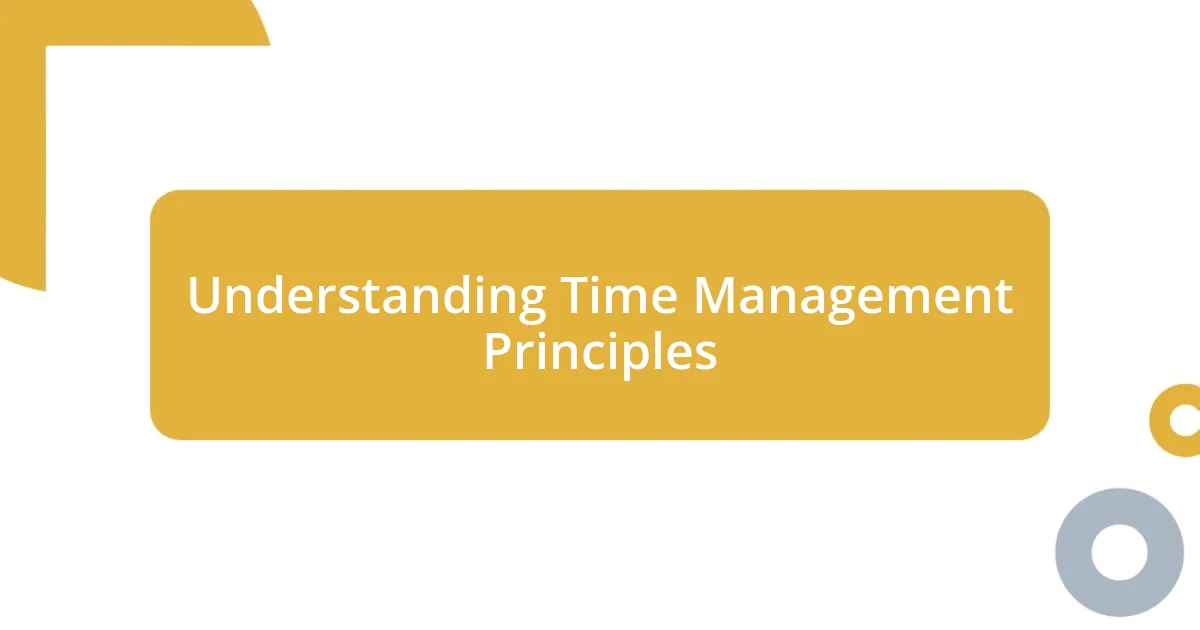
Understanding Time Management Principles
Time management is not just about fitting more tasks into your day; it’s about maximizing productivity while maintaining balance. I remember a time when I was overwhelmed with projects, feeling like I was constantly racing against the clock. It dawned on me then that understanding my priorities was crucial to managing my time effectively. I began asking myself, “What tasks truly need my attention right now?”
In my experience, the principle of setting clear goals has been a game-changer. When I started breaking my long-term objectives into smaller, manageable tasks, things became less daunting. Have you ever found that crossing off a small goal gives you a surprising sense of accomplishment? It can really boost your motivation and help build momentum for those bigger tasks waiting for you at the finish line.
Another vital principle is the importance of flexibility. I’ve learned that life can throw unexpected challenges your way, and adapting your timing can make all the difference. For example, when my routine is disrupted, rather than getting frustrated, I take a moment to reassess my priorities and adjust my schedule. This sense of fluidity allows me to cope with interruptions gracefully, rather than feeling overwhelmed by them. Does that resonate with you? Finding that balance between structure and adaptability has truly transformed the way I view time management.
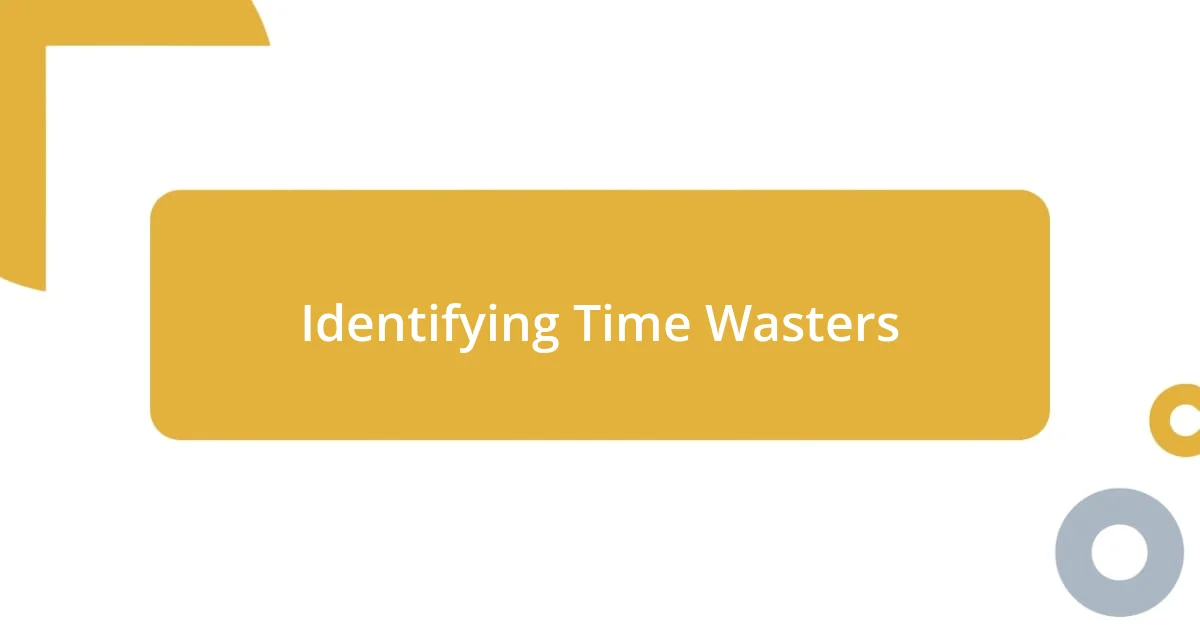
Identifying Time Wasters
Identifying time wasters has been a pivotal step in enhancing my productivity. I vividly recall a period when I was glued to social media during work hours, thinking it was just a quick break. However, I quickly realized those “quick” breaks would stretch into hours without me even noticing. It’s moments like these that remind me how crucial it is to recognize distractions before they chip away at my valuable time.
Here’s a list of common time wasters that I’ve learned to spot and avoid in my daily routine:
- Social Media: Scrolling through feeds can quickly consume time.
- Multitasking: Juggling multiple tasks often leads to decreased focus and errors.
- Unnecessary Meetings: Many meetings could be emails or skipped altogether.
- Procrastination: Putting off tasks can create a snowball effect of stress.
- Overcommitting: Saying yes to every request can dilute your focus and energy.
By identifying these culprits, I’ve become more intentional about how I allocate my time, ultimately leading to a more productive and fulfilling day.
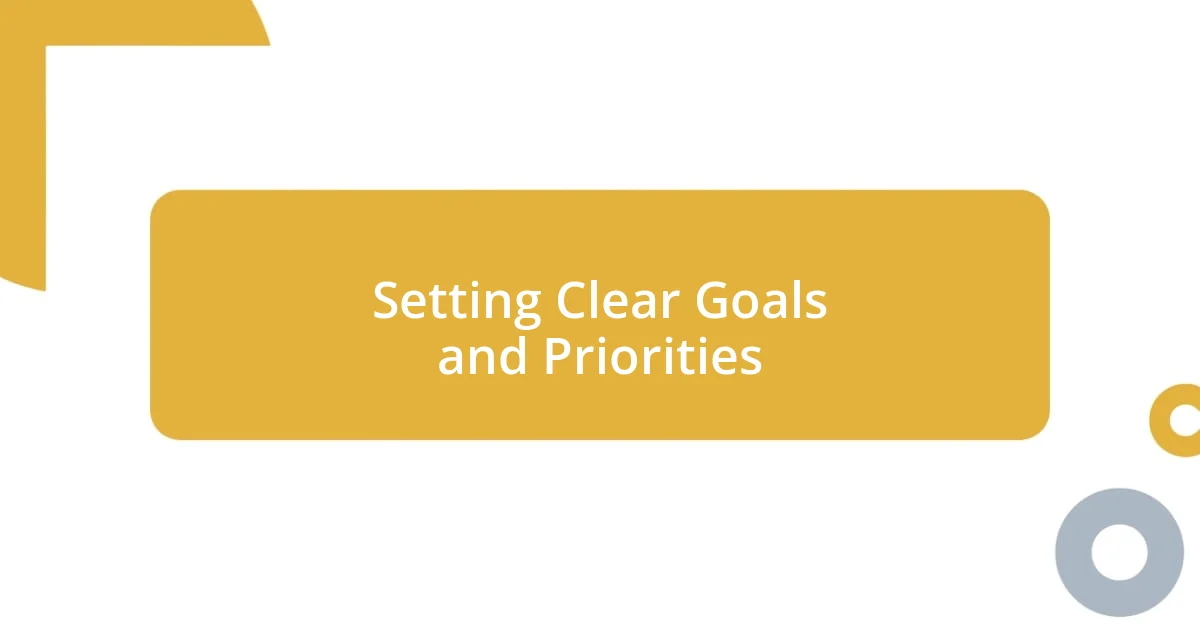
Setting Clear Goals and Priorities
Setting clear goals and priorities forms the bedrock of effective time management. I remember when I first started framing my days around specific goals. Initially, it felt a bit rigid, almost suffocating, but over time, it turned into a liberating practice. Having clear objectives allowed me to direct my energy toward what truly mattered, which ultimately helped in alleviating that incessant feeling of being swamped.
Prioritization is like having a compass guiding me through the chaotic waters of daily tasks. On days when I listed out my top three priorities, I noticed my focus sharpened, making it easier to resist distractions. Have you ever tackled a daunting project by simply narrowing it down to its most essential components? It’s almost magical how clarity can cut through overwhelming feelings, leaving me with a sense of accomplishment as I check each task off my list.
I also find that it’s important to revisit those goals regularly. By checking in with myself, I ensure that my priorities evolve alongside my needs and circumstances. It can be pretty enlightening to recognize that some tasks, once deemed crucial, have lost their urgency. In my case, re-evaluating goals has often led to surprising shifts in my daily routine, freeing up time for unexpected opportunities or activities that reignite my passion.
| Goals | Priorities |
|---|---|
| Provide Direction | Enable Focus |
| Set Benchmarks for Success | Help in Decision-Making |
| Clarify What Truly Matters | Reduce Overwhelm |
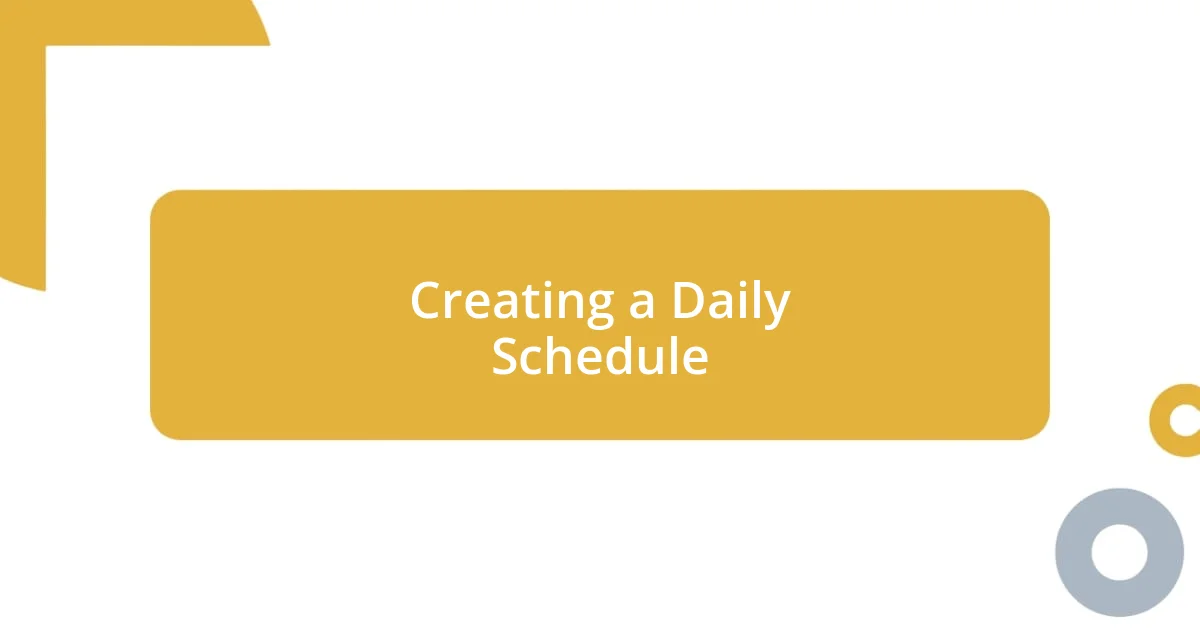
Creating a Daily Schedule
Creating a daily schedule has been a transformative aspect of my time management journey. I often start my mornings by mapping out my day in a planner. There’s something satisfying about putting pen to paper, almost like giving my day a roadmap. When I do this, I find that I’m more anchored throughout the day. Have you ever noticed how it feels when you have clarity? It’s a game changer.
When I’m crafting my schedule, I block off specific times for various tasks, but I also leave some “buffer” time for unexpected interruptions. It took me a while to embrace this concept, but I learned that it’s impossible to predict every little bump in the road. For instance, there was a time when I overscheduled myself, leading to unnecessary stress when things didn’t go as planned. Now, I always remind myself, flexibility isn’t failure; it’s a key to balance.
I also like to set themes for different days. For example, Tuesday could be focused on creative projects, while Thursday might be dedicated to meetings. This approach not only streamlines my focus but also injects a little fun into my routine. I can’t help but wonder if you’ve ever tried anything similar? Assigning themes makes the week feel more alive and purpose-driven, and it really has brought a refreshing spark into my daily grind.
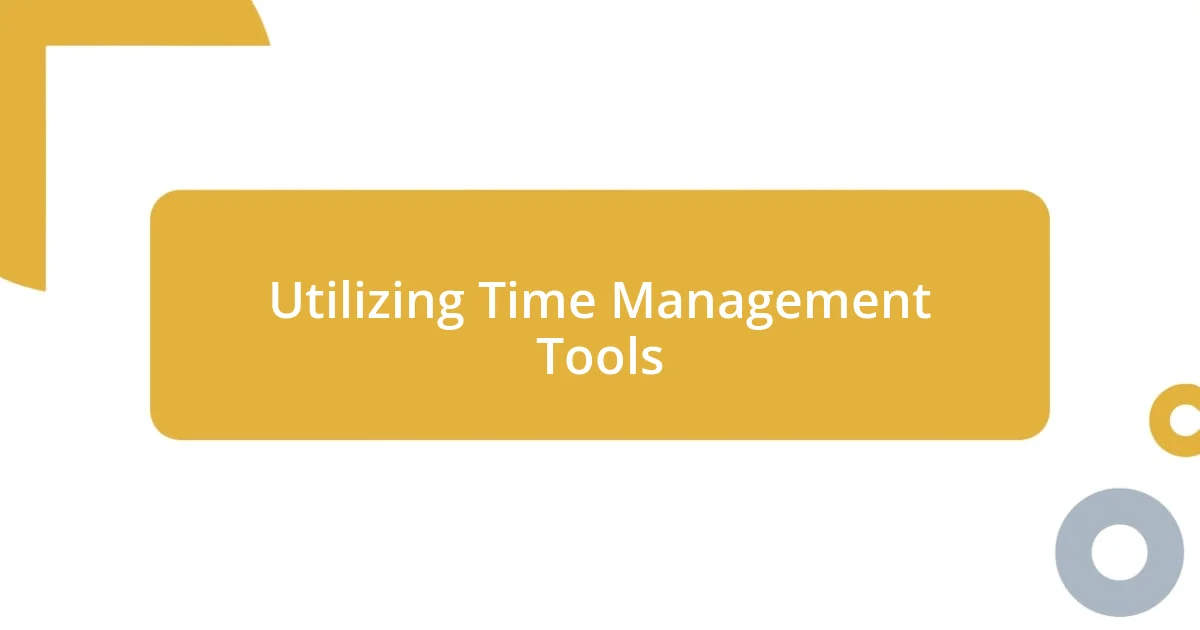
Utilizing Time Management Tools
Utilizing time management tools has been a game-changer for me. I have experimented with various apps and planners, but what truly clicked was the combination of digital and analog tools. For example, I use a digital calendar to schedule meetings and deadlines, while a paper planner sits beside me for everyday tasks and notes. This hybrid approach gives me the instant access of technology alongside the tactile satisfaction of writing things down—something that truly grounds me throughout the day.
When I first started using a task management app, I wondered if it would just become another thing to check off my list. To my surprise, it became my ally. I loved how I could categorize tasks by project and deadline, and the satisfaction of marking items as complete was incredibly rewarding. Do you know that feeling of ticking off a task and watching your progress visually? That little dopamine hit energizes me to keep pushing forward, and I can’t overstate how encouraging that can be during a busy week.
I also came to appreciate the importance of reminders and alerts. Initially, I viewed these as annoyances, but now they serve as gentle nudges to keep me on track. For instance, I once missed an important project deadline because I simply got caught up in other tasks. Now, I set reminders a day or two in advance, which has drastically reduced my stress levels. Have you ever experienced that relief of being reminded just in time? Learning how to integrate reminders into my workflow has certainly helped keep those tight deadlines manageable.
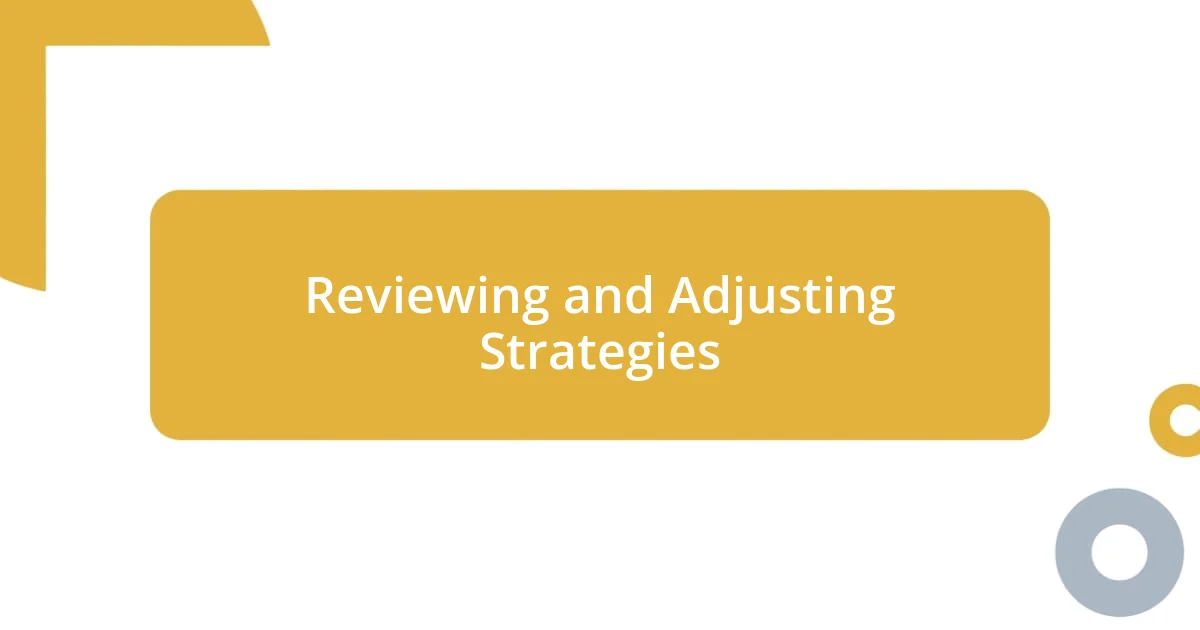
Reviewing and Adjusting Strategies
When it comes to reviewing and adjusting my time management strategies, I find regular check-ins crucial. At the end of each week, I take a moment to assess what worked and what didn’t. This reflection often reveals patterns. Like last month, I realized that my Thursday meetings were dragging on longer than necessary. Recognizing this allowed me to rearrange things, keeping everyone on track and focused.
Adjusting my strategies isn’t always easy, but embracing change has become a part of my routine. For instance, I once stubbornly clung to a multi-tasking approach, thinking it was efficient. However, I later discovered that it led to dropped balls and frustration. By prioritizing single-task focus, I drastically improved my productivity! I wonder if you’ve ever experienced a similar turning point? Sometimes, it takes a bit of trial and error to find what truly aligns with our working style.
Emotions play a big role in this process, too. I used to feel a bit defeated when things didn’t unfold as planned, but I’ve learned to view adjustments as opportunities for growth. When I shifted my mindset to embrace flexibility, it transformed my perspective. I now find it exciting to tweak my strategies, as if I’m refining a recipe until it tastes just right. Have you considered how your feelings influence your approach to time management? Recognizing and addressing these emotions can turn the process into a powerful personal journey.
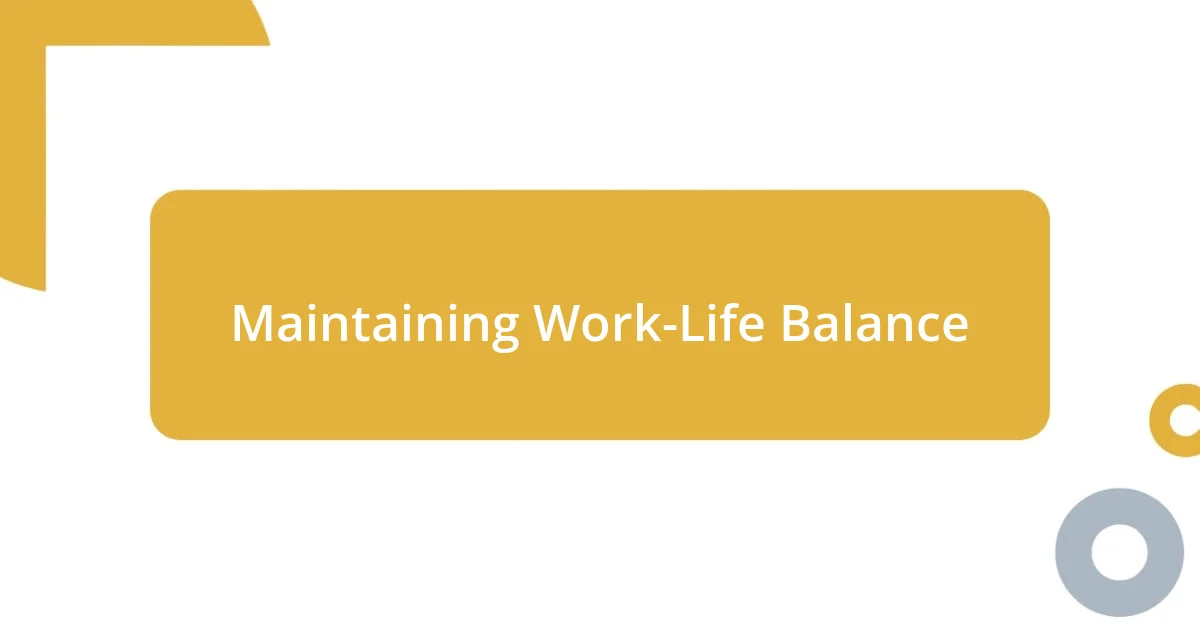
Maintaining Work-Life Balance
Finding a work-life balance is an ongoing journey for me. I’ve discovered that setting firm boundaries around my work hours is essential. Without that structure, it’s all too easy for work tasks to seep into my personal time. I vividly remember a week when I was so caught up in a project that I missed a family dinner. The regret I felt made me realize how important it is to switch off and enjoy my time with loved ones.
One strategy that’s helped me maintain this balance involves prioritizing personal time just like I prioritize work meetings. For example, I schedule “me time” in my calendar, treating it as inviolable as any obligation. When I look forward to a weekend hiking trip or simply a night with my favorite book, I find it rejuvenates my mind and spirit. Have you discovered any activities that recharge your energy? Engaging in things that spark joy can significantly enhance how you approach your work and personal life.
I also pay attention to my emotional needs, understanding that a balanced life isn’t just about time management. I remember feeling overwhelmed with guilt whenever I had to say no to friends for work-related reasons. Recognizing that my well-being is vital to my productivity helped me reshape my approach. Now, I embrace saying no when necessary, allowing me to say yes to what truly matters. How do you handle those feelings of guilt? Accepting that it’s okay to prioritize yourself can be liberating and ultimately leads to greater fulfillment in both your professional and personal life.














